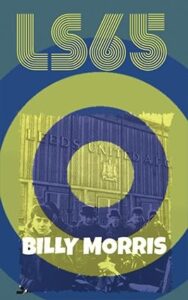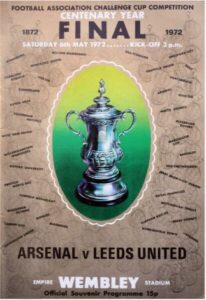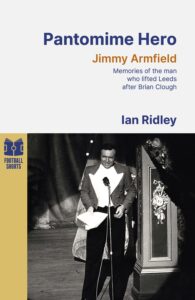Book Review: LS65 (Eighties Leeds Series) by Billy Morris
Bibliography
Billy Morris was born in Leeds in 1966. He left Leeds in the late 1990s and has lived and worked in Europe and USA. He now lives mainly in South East Asia.
He wrote his first book Bournemouth 90 in 2021 and published the sequel, LS92, in 2022. The books form the Eighties Leeds series are dark, crime fiction set against the backdrop of a northern English city trying to reinvent itself, as its once famous football team emerges from a period in the doldrums to reclaim its position at the forefront of European football.
Morris’s third book Birdsong on Holbeck Moor is set during the tumultuous period at the end of the First World War. The Leeds Pals have been decimated at the Somme and the soldiers who survived return to find a city on the grip of a global pandemic, with food rationing, unemployment and a football team facing expulsion from the league due to financial irregularities during the war years. Throw in some corruption, inter-city gang wars and witchcraft and you have the makings of a gritty, Edwardian thriller.
 LS65 Review
LS65 Review
This fourth book from Billy Morris forms a third part of the Eighties Leeds series, and is a prequel set in 1965. The central focus is the back story of Alan Connolly, one of the main characters in Bournemouth 90 and opens with the teenager arriving in Leeds from Glasgow during the swinging sixties.
What Morris has established through his previous books is a winning formula. And as the saying goes, “if it ain’t broke, don’t fix it.”
Reassuringly in LS65 readers will find the usual heady mix of dark gritty menace, the underworld, and football set against a convincing background of the time – a culture of coffee bars and clubs, drugs and dance halls, Mods and their mopeds.
Once again the research is spot-on with great detail about the city of Leeds and places still familiar today, but reflecting also many that have long gone, yet synonymous with a city much changed since the sixties.
Additionally, what Morris also demonstrates is his ability to provide a full back story to his characters, that in this instance go a long way to understanding the Alan Connolly that features in Bournemouth 90.
There is also some homage or influence of David Peace’s writing, with the flashback sequences within LS65 reminding this reader of the style adopted in parts of The Damned Utd.
 In Bournemouth 90 the football storyline was one of a pivotal moment as Leeds United regained their top division status, leading to them becoming Champions of England once more in 1991/92. In LS65 the football backdrop is once again an important moment in the Club’s history, with the Elland Road team, after only having been promoted the season before, missing out on the First Division title on goal average and then losing in the FA Cup Final 2-1 to Liverpool. However, despite those disappointments in 1965 it was the start of what was to be a Golden Era under Don Revie as Leeds United became one of the best sides in England and Europe.
In Bournemouth 90 the football storyline was one of a pivotal moment as Leeds United regained their top division status, leading to them becoming Champions of England once more in 1991/92. In LS65 the football backdrop is once again an important moment in the Club’s history, with the Elland Road team, after only having been promoted the season before, missing out on the First Division title on goal average and then losing in the FA Cup Final 2-1 to Liverpool. However, despite those disappointments in 1965 it was the start of what was to be a Golden Era under Don Revie as Leeds United became one of the best sides in England and Europe.
(Publisher: Independently published. September 2023. Paperback: 217 pages)
Buy the book here: LS65
 I first visited Leeds United’s Elland Road home on 19 September 1970 when they hosted Southampton. A rite of passage allowing me to witness the most successful Leeds side to grace the LS11 turf. An overcast autumn Saturday seeing a John Giles penalty claim both points (spoils for a victory back then) for Don Revie’s warriors in white.
I first visited Leeds United’s Elland Road home on 19 September 1970 when they hosted Southampton. A rite of passage allowing me to witness the most successful Leeds side to grace the LS11 turf. An overcast autumn Saturday seeing a John Giles penalty claim both points (spoils for a victory back then) for Don Revie’s warriors in white. This a journal of the club’s fortunes during an ignominious three seasons in the third tier of English football, between 2007-2010. Revealing the writer’s recollections of that first drop into League One, the Administration process, the team’s galvanisation borne from the point deduction and the subsequent trinity of winters in the abyss.
This a journal of the club’s fortunes during an ignominious three seasons in the third tier of English football, between 2007-2010. Revealing the writer’s recollections of that first drop into League One, the Administration process, the team’s galvanisation borne from the point deduction and the subsequent trinity of winters in the abyss. The successful Don Revie era at Leeds United has been the subject of many books down the years, with the debut novel from Nicholas Dean, The Boy Who Saved Billy Bremner, a new addition to the list.
The successful Don Revie era at Leeds United has been the subject of many books down the years, with the debut novel from Nicholas Dean, The Boy Who Saved Billy Bremner, a new addition to the list. FBR: What is your first football memory and who do you support?
FBR: What is your first football memory and who do you support? Ian Ridley is an award-winning journalist and author. His latest venture is Football Shorts which are a series of books in a collaboration between his own publishing company Floodlit Dreams and renowned sports book publisher, Pitch Publishing. Ridley details in the Notes and Acknowledgments that the inspiration of the series came about during lockdown and his desire for a short sporting read. The intention is that there are to be three books a year, with Pantomime Hero: Memories of the Man Who Lifted Leeds United After Brian Clough by Ridley, the first, with the others coming from former Women in Football CEO Jane Purdon and comedian and writer Andy Hamilton during 2023.
Ian Ridley is an award-winning journalist and author. His latest venture is Football Shorts which are a series of books in a collaboration between his own publishing company Floodlit Dreams and renowned sports book publisher, Pitch Publishing. Ridley details in the Notes and Acknowledgments that the inspiration of the series came about during lockdown and his desire for a short sporting read. The intention is that there are to be three books a year, with Pantomime Hero: Memories of the Man Who Lifted Leeds United After Brian Clough by Ridley, the first, with the others coming from former Women in Football CEO Jane Purdon and comedian and writer Andy Hamilton during 2023. Watching the recent 2022 World Cup there were a couple of things in terms of the fans attending that stood out. Firstly, irrespective of the country, and whether a child or an adult the vast majority were wearing replica shirts creating swathes of colour in the stands. Secondly, despite The FA having signed with Nike in 2012 to produce the England kits, many fans favoured the wearing of retro shirts from before that period. Prominent amongst them were the Three Lions home and away shirts released in 1980 and 1982 respectively, synonymous with the European Championship Finals in Italy and the World Cup in Spain. The design with the distinctive coloured bands across the shoulders was derided by many leading names in the game at the time, but yet over 40 years later are much loved by fans. The original maker of these now classic tops? A Leicester firm called Admiral.
Watching the recent 2022 World Cup there were a couple of things in terms of the fans attending that stood out. Firstly, irrespective of the country, and whether a child or an adult the vast majority were wearing replica shirts creating swathes of colour in the stands. Secondly, despite The FA having signed with Nike in 2012 to produce the England kits, many fans favoured the wearing of retro shirts from before that period. Prominent amongst them were the Three Lions home and away shirts released in 1980 and 1982 respectively, synonymous with the European Championship Finals in Italy and the World Cup in Spain. The design with the distinctive coloured bands across the shoulders was derided by many leading names in the game at the time, but yet over 40 years later are much loved by fans. The original maker of these now classic tops? A Leicester firm called Admiral. This is the third book from Billy Morris, with his debut novel
This is the third book from Billy Morris, with his debut novel